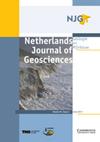Investigating seismicity rates with Coulomb failure stress models caused by pore pressure and thermal stress from operating a well doublet in a generic geothermal reservoir in the Netherlands
IF 2.3
2区 地球科学
Q3 GEOSCIENCES, MULTIDISCIPLINARY
Netherlands Journal of Geosciences-Geologie En Mijnbouw
Pub Date : 2023-06-22
DOI:10.1017/njg.2023.7
引用次数: 0
Abstract
Abstract The utilisation of geothermal energy in the Netherlands is primarily focused on deep sedimentary aquifers, which are often intersected by major faults. Geothermal operations (i.e. fluid production and injection) may alter the effective stress state along these faults and trigger induced seismic events. Pore pressure perturbations have been generally considered the main driver of injection-induced seismicity. However, thermal stresses caused by temperature gradients between the re-injected cold fluid and the reservoir rock may also contribute to the triggering of earthquakes in geothermal reservoirs. While existing geothermal power plants operating in sandstone reservoirs did not produce any major induced seismicity, it is a matter of debate whether a reduction in the temperature of the re-injected fluid could increase the seismic hazard potential. In this study, we applied modified Gutenberg–Richter statistics based on frictional Coulomb stress variations implemented in a coupled thermo-hydro-mechanical model to estimate the seismic hazard caused by the operation of a geothermal doublet. We conducted a systematic parametric study to assess and rank the impact of different intrinsic (geological) and extrinsic (operational) parameters on the induced seismic hazard potential. We identified a competing mechanism between induced variations in pore pressure and thermal stress within the reservoir in controlling induced seismicity. We found that stress changes induced by pore pressure variations are the main cause of seismic hazard, although thermally induced stresses also contribute significantly. The results indicate that by optimising the operational parameters it is possible to increase production efficiency while maintaining a long-term control over the fluid injection-induced seismicity.利用库仑失效应力模型研究荷兰某普通地热储层的孔隙压力和热应力引起的地震活动性
荷兰地热能源的利用主要集中在深层沉积含水层,这些含水层经常被主要断层相交。地热开采(即流体开采和注入)可能改变这些断层的有效应力状态,引发诱发地震事件。孔隙压力扰动通常被认为是注入诱发地震活动的主要驱动因素。然而,由回注冷流体与储层岩石之间的温度梯度引起的热应力也可能是引发地热储层地震的原因之一。虽然在砂岩储层中运行的现有地热发电厂没有产生任何主要的诱发地震活动,但降低再注入流体的温度是否会增加地震危险的潜在可能性,这是一个有争议的问题。在这项研究中,我们应用基于摩擦库仑应力变化的修正古腾堡-里希特统计,在一个耦合的热-水-力学模型中实现,以估计地热双峰运行引起的地震危险性。我们进行了系统的参数研究,以评估和排序不同的内在(地质)和外在(操作)参数对诱发地震危险潜力的影响。我们确定了储层内孔隙压力和热应力诱导变化在控制诱发地震活动性方面的竞争机制。我们发现孔隙压力变化引起的应力变化是地震危险的主要原因,尽管热诱发应力也起着重要作用。结果表明,通过优化操作参数,可以提高生产效率,同时保持对流体注入引起的地震活动的长期控制。
本文章由计算机程序翻译,如有差异,请以英文原文为准。
求助全文
约1分钟内获得全文
求助全文
来源期刊
CiteScore
4.00
自引率
25.90%
发文量
14
审稿时长
>12 weeks
期刊介绍:
Netherlands Journal of Geosciences - Geologie en Mijnbouw is a fully open access journal which publishes papers on all aspects of geoscience, providing they are of international interest and quality. As the official publication of the ''Netherlands Journal of Geosciences'' Foundation the journal publishes new and significant research in geosciences with a regional focus on the Netherlands, the North Sea region and relevant adjacent areas. A wide range of topics within the geosciences are covered in the journal, including "geology, physical geography, geophyics, (geo-)archeology, paleontology, hydro(geo)logy, hydrocarbon exploration, modelling and visualisation."
The journal is a continuation of Geologie and Mijnbouw (published by the Royal Geological and Mining Society of the Netherlands, KNGMG) and Mededelingen Nederlands Instituut voor Toegepaste Geowetenschappen (published by TNO Geological Survey of the Netherlands). The journal is published in full colour.

 求助内容:
求助内容: 应助结果提醒方式:
应助结果提醒方式:


